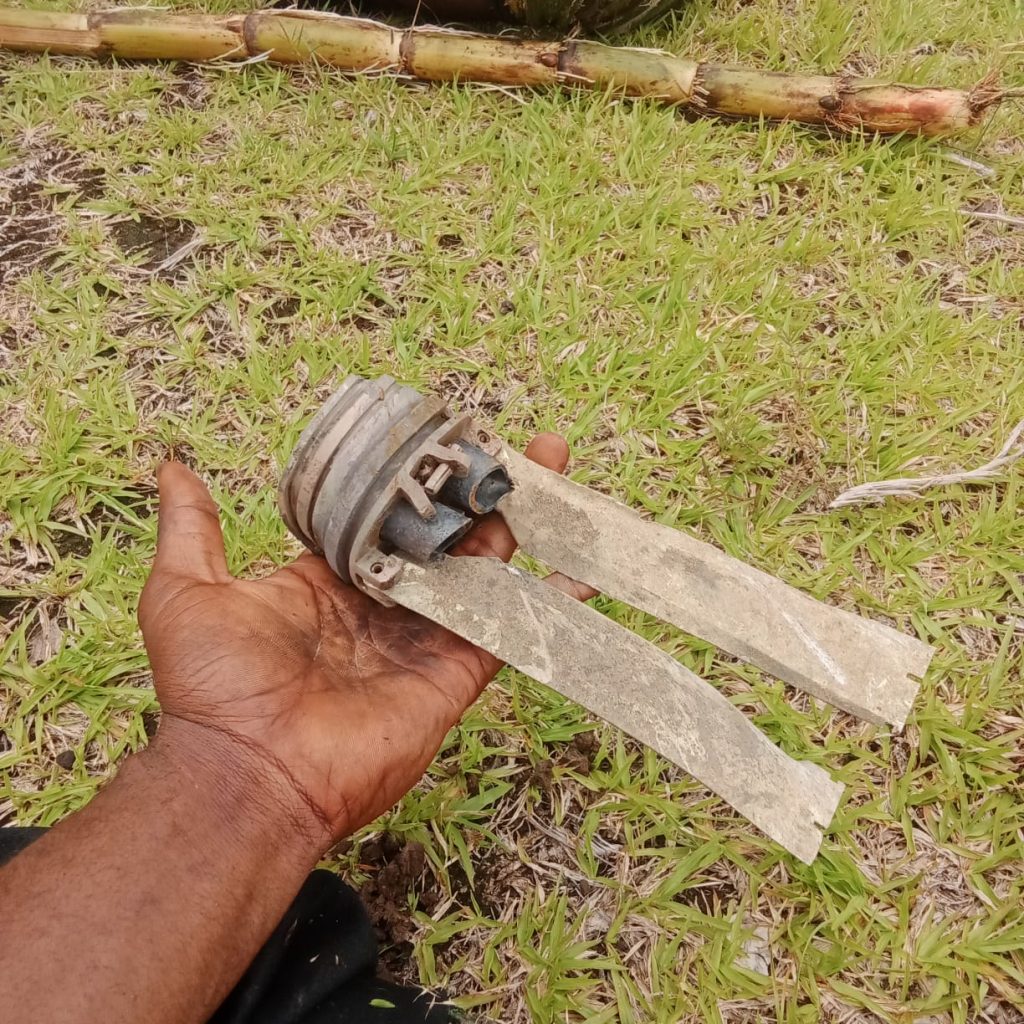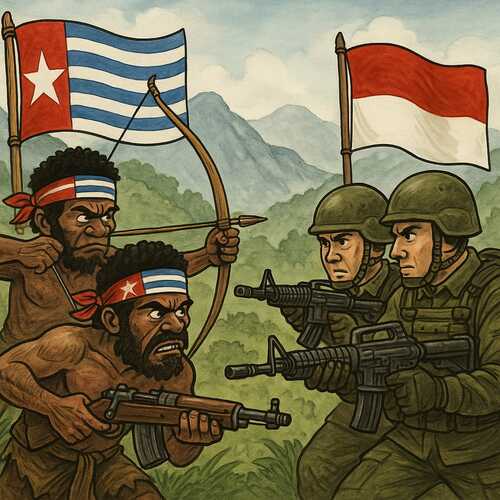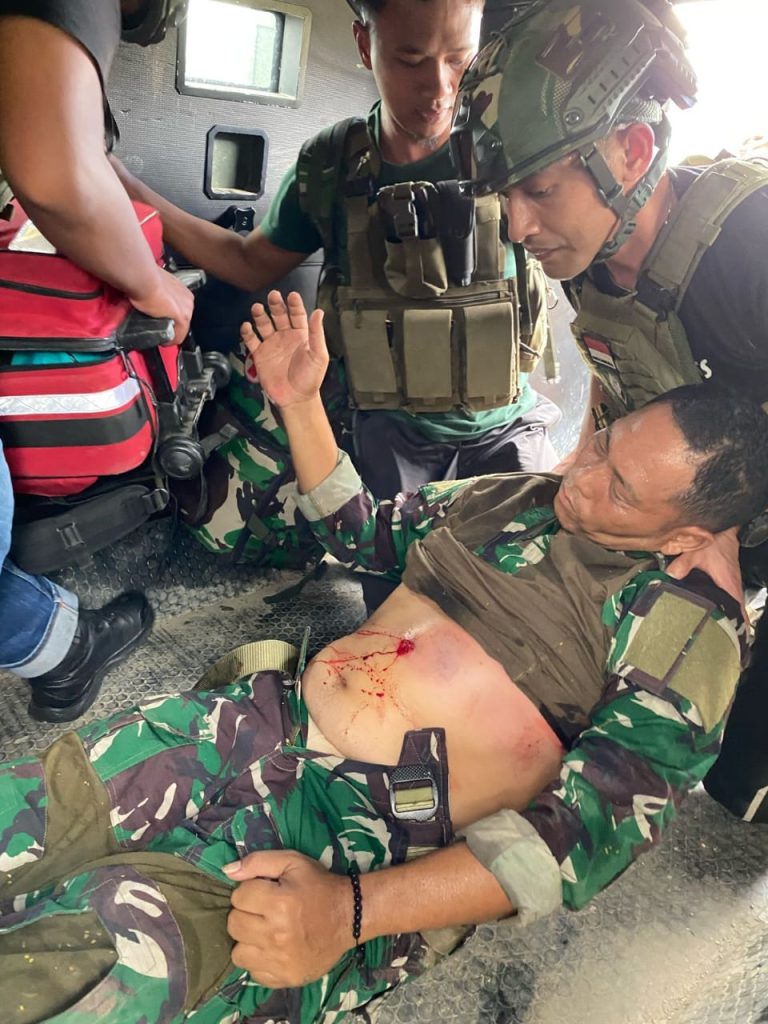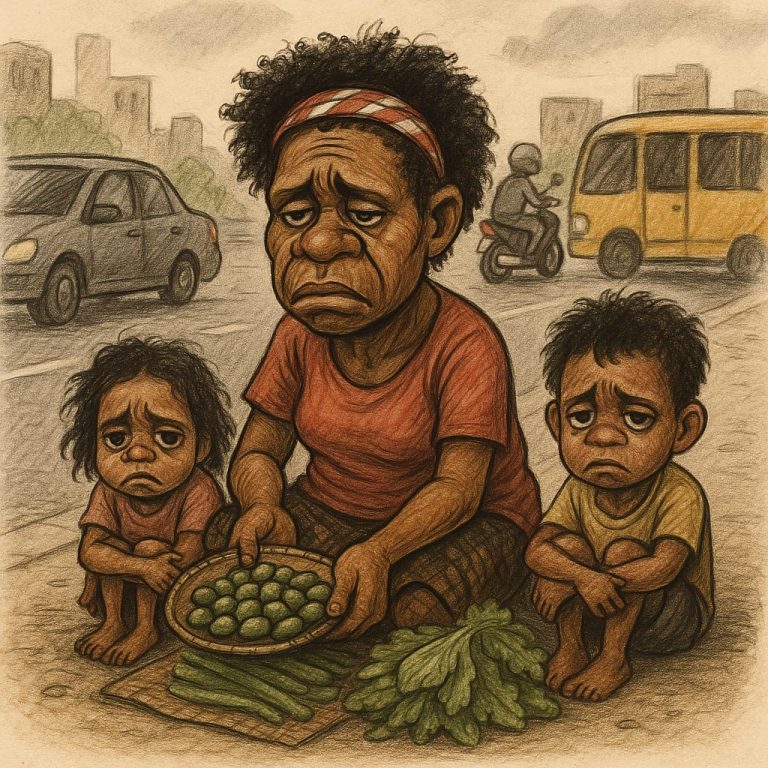
Shrapnel from mortar bombs collected by civilians after an Indonesian Military airstrike in Puncak Jaya, Papua (Photo Courtesy)
Puncak Jaya, Papua – The armed conflict in Papua has reached a new height following the airstrikes launched by the Indonesian military since early April 2025. These attacks, which involved rocket bombs and mortars, have not only targeted the positions of the West Papua National Liberation Army (WPNLA/TPNPB) but have also struck civilian settlements.
Reports indicate that three Indonesian military helicopters carried out airstrikes on the Sinak District in Puncak Jaya starting from April 3. The attacks have caused significant damage to several areas.
Timobut village, located in the Puncak Jaya region, was one of the major targets of the airstrikes. Homes of civilians were destroyed by bomb blasts, with the walls of houses riddled by the intense explosions.
According to a statement from Major General Lekagak Telenggen, Commander of the TPNPB’s General Operations, issued through TPNPB spokesman Sebby Sambom, the impact of these airstrikes has resulted in substantial material damage.
“The indiscriminate bombing poses a high risk to civilians, especially women and children. This severely harms people who are not involved in the conflict,” Telenggen said.
Urgent Call for Ceasefire and Protection of Civilians
In response to the continuing airstrikes, the WPNLA/TPNPB’s Central Command issued a statement urging Indonesian President Prabowo Subianto and the Indonesian National Military (TNI) commander to immediately cease the indiscriminate bombing. The statement emphasized that such attacks must end, as they could lead to civilian casualties.
“If war must occur, then target our forces in the battlefield, not the innocent homes of civilians,” the statement read in a press release on Thursday, April 17, 2025.
TPNPB also demanded that Indonesia military must respect international humanitarian law, which mandates that combat should not endanger civilian lives.
International Negotiations Call
Meanwhile, Brigadier General Undius Kogoya, Commander of TPNPB’s VIII Command in Intan Jaya, expressed that the Indonesian government must be prepared to sit down at an international negotiation table to resolve the political issue of Papua.
In a press release issued on April 15, 2025, Kogoya firmly stated that if Indonesia refuses dialogue, the war in Papua will continue indefinitely without a clear solution.
“We are prepared to fight until the end of time if Indonesia refuses to open the space for negotiations. We only seek a peaceful resolution through international negotiations facilitated by the United Nations,” Kogoya said resolutely.
This conflict, which has lasted for over five decades, continues to worsen the humanitarian situation in Papua. Currently, more than 100,000 Papuans have been forced to flee due to the unrelenting violence. Meanwhile, the airstrikes targeting civilian areas are exacerbating the situation.
According to WPNLA/TPNPB reports, more than 20 homes in Timobut village have been destroyed, and the impact of the airstrikes is particularly felt by those living far from the frontlines. The people are increasingly trapped in a cycle of violence, with no clear way out.
Mortar Bombs from Serbia
In addition to the attacks on civilians, TPNPB has raised concerns over the use of mortar bombs, allegedly purchased from Serbia by the Indonesian military. They are calling on the international community, especially the United Nations, to investigate the origins of the weapons used in these airstrikes to ensure that all actions taken comply with international law.
The desire to end the fighting and open a dialogue has become more pressing. For TPNPB, the only way out of this long-standing conflict is through international negotiations facilitated by the United Nations, which would address the long-ignored political roots of the Papua issue.
As the situation in Papua intensifies, the airstrikes by the Indonesian military are not only threatening the TPNPB forces but also destroying the lives of innocent civilians who are not part of the conflict.
The international community, including the United Nations, must play a crucial role in urging both the Indonesian government and TPNPB to open a dialogue. Without a legitimate political resolution, the conflict, which has now spanned more than half a century, will continue to claim lives and destabilize peace in Papua.
Moving forward, a more humane and sustainable solution is needed, one that prioritizes the safety of Papua’s civilian population and upholds human rights. Diplomacy, dialogue, or international negotiations must be the pathway to de-escalate tensions and end this protracted conflict. (Julian Haganah Howay)







